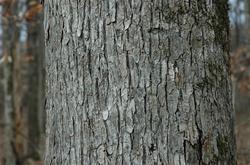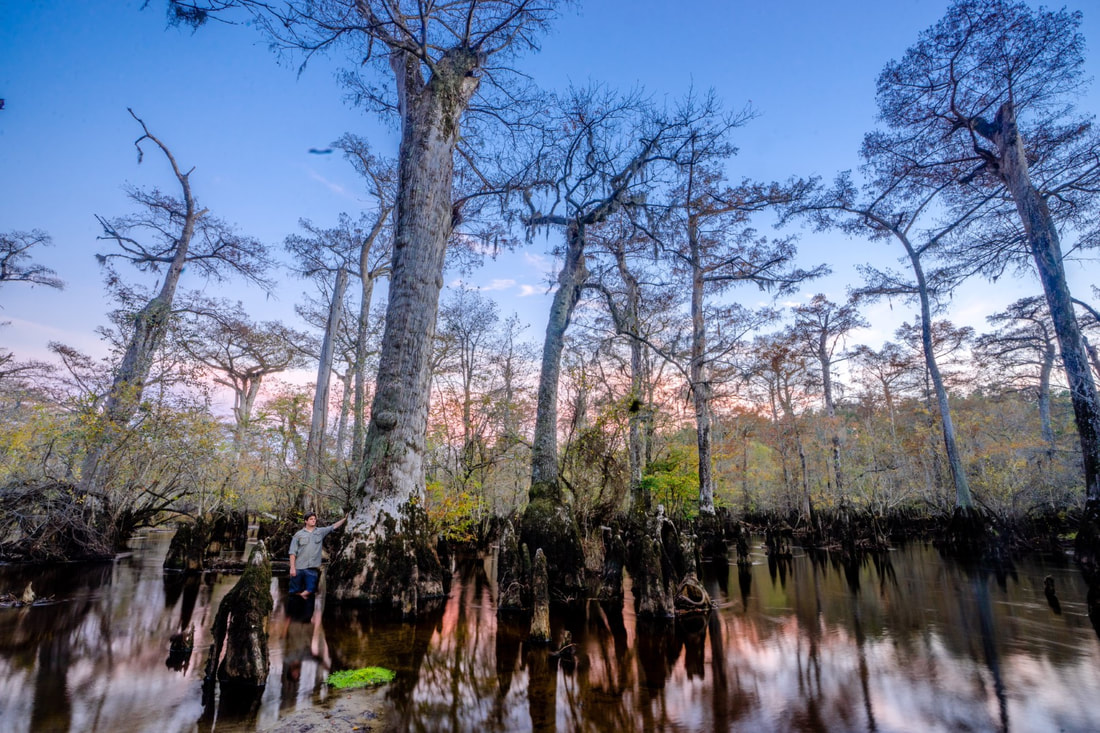|
We are pleased to share with you an Earth Day essay written by Thomas Wentworth, PhD, inspired by his experience at the "Three Sisters Swamp" of the Black River in eastern North Carolina. Tom is Alumni Distinguished Undergraduate Professor, Emeritus, Department of Plant & Microbial Biology, North Carolina Statue University. I visited BLK227 on a Tuesday for an interview. BLK227 is a Baldcypress tree (Taxodium distichum for the botanists) in the Three Sisters Swamp section of the Black River, a bit west of Burgaw, North Carolina. BLK227 was so named by Dr. David Stahle, who runs the Tree Ring Laboratory in the Department of Geosciences at the University of Arkansas in Fayetteville. BLK227 holds the current world record for documented age of any Baldcypress tree, 2,629 years old this year. That’s a minimum age, by the way, because Dr. Stahle had to core BLK227 at a height of 10 feet above the swamp floor, and it is unknown how long it takes for a Baldcypress seedling to reach 10 feet in height. That minimum age is impressive - that’s 629 years Before the Common Era. BLK227’s age firmly establishes Baldcypress as the oldest wetland tree species on Planet Earth, and number five on the worldwide list of the oldest known continuously living, sexually reproducing, non-clonal tree species based on dendrochronology, the scientific study of tree rings. < click "Read More" below right >
2 Comments
Southern Conservation Partners shares the concerns expressed by many friends and defenders of the forest ecosystems of the southern U.S., which are currently being exploited and threatened by mass removal for export as wood pellet biofuels principally in Europe. Many of the forests being cut are already imperiled river bottomlands forests ecosystems that are critically necessary for sustenance of the environmental health of the southern U.S. region.The biofuel producing companies are “green washing” their activities and propaganda based on intentionally false and deceptive claims that cutting and burning trees on a mass scale is “carbon neutral” because the forests may regrow sometime in the long-term future and hence forests are a “renewable” resource. Most of the processing plants that collect, chip, and process cut trees in huge volumes for export are located in marginalized, economically distressed communities, and those industrial plants are operating at full capacity 24/7 and emitting huge quantities of airborne pollutants. The Southern Environmental Law Center, the Dogwood Alliance, and the National Wildlife Federation are leading defense actions to save our forests.
We recommend you watch this 30-minute documentary film: Burned: Are Trees the New Coal? In addition, the North Carolina Wildlife Federation and its coastal Island Wildlife Chapter recently presented an excellent, profoundly important webinar about this crisis. VIEW the recording of that webinar. Several other resources on this important issue: Wood Pellet Map Carbon Markets Article--How Marginalized Communities in the South are Paying the Price for “Green Energy” in Europe Forests are vital elements to our nation’s infrastructure and environmental health. Strong climate action rooted in justice has never been more urgent. Valuing standing forests is our best climate defense! Take the “Stand 4 Forests Pledge” HERE.  Photo by Tom Earnhardt Photo by Tom Earnhardt Southern communities can’t afford to be an after-thought when it comes to federal policy. The South is experiencing more climate impacts than any other region of the US. Rural, Southern communities are facing disproportionate impacts due to logging and wood production. Our region is also home to five of the top 10 carbon emitters in the country and is experiencing forest destruction from industrial logging at four times the rate of South American rainforests. Our survival depends on immediate and inclusive solutions. The "Southern Communities for a Green New Deal" (SC4GND) policy platform builds on the Green New Deal to center frontline communities in the South. The Dogwood Alliance worked with community leaders and other organizations to develop the forest policy part of the policy platform. The vision we created calls for:
It’s time for a new vision for the southern economy. We need a just transition to clean, renewable energy. We need to invest in a regenerative economy rooted in justice and equity. We need to work together for a healthy, strong, and resilient future. Please learn about the SC4GND policy platform: READ MORE. --Danna Smith, founder of the Dogwood Alliance
 Photo by Laura Cotterman Photo by Laura Cotterman The South’s forests encompass a broad range of ecosystems and landscapes and are home to many rare, threatened, and endemic species of plants and animals. Forest ownership and uses in the South have been changing dramatically in the early 21st century, raising questions about the future of our southern forests. A huge transition in forestland ownership has been occurring, with the forest products industry divesting about three-fourths of its timberland holdings in the southern U.S. in the ten years between 1998 and 2008. What are the implications for forest management and sustainability? How will forest land ownership in the South continue to change in the future? Private landowners hold 86 percent of the forested land in the southern U.S., with two-thirds of this area owned by families or individuals. The average size of family-owned forest holdings is small: only 29 acres (although 60% of family-owned forests exceed 100 acres in size). Two-thirds of these private landowners harvest and sell trees from their land. In recent history, much of the South’s forests were owned by big timber production industries. . . . |
When we see land as a community to which we belong, we may begin to use it with love and respect.... Conservation, viewed in its entirety, is the slow and laborious unfolding of a new relationship between people and land." There is in fact no distinction between the fate of the land and the fate of the people. When one is abused, the other suffers. From the PresidentSCP President Chuck Roe looked at land conservation along the route of John Muir's "Southern Trek." About ViewpointThis blog offers views of our Board and partners. We invite your viewpoint on the following questions: Archives
April 2024
Categories
All
|


 RSS Feed
RSS Feed